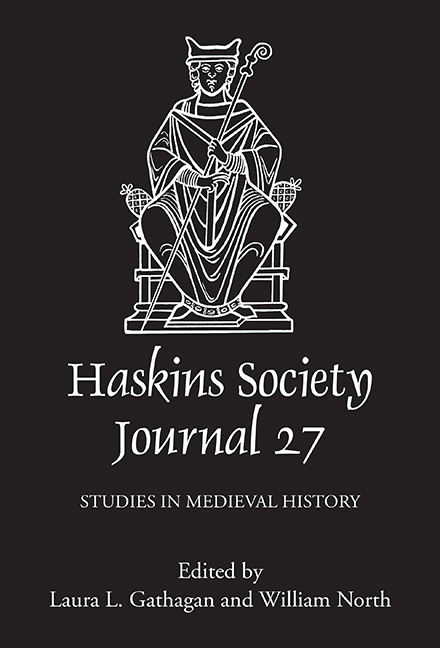Book contents
- Frontmatter
- Contents
- List of Figures
- Editors’ Note
- Abbreviations
- 1 Rural Settlement in Roman Britain and Its Significance for the Early Medieval Period
- 2 Holy Relics, Authority, and Legitimacy in Ottonian Germany and Anglo-Saxon England
- 3 Beyond the Obvious: Ælfric and the Authority of Bede
- 4 Byrhtferth’s Historia Regum and the Transformation of the Alfredian Past
- 5 Geoffrey le Bel of Anjou and Political Inheritance in the Anglo-Norman Realm
- 6 Observations on the Twelfth-century Historia of Alfred of Beverley
- 7 Helena, Constantine, and the Angevin Desire for Jerusalem
- 8 The Revolts of the Embriaco and the Fall of the County of Tripoli
- 9 Jewish Women, Christian Women, and Credit in Thirteenth-Century Catalonia
- 10 Military Entrepreneurs in the Armies of Edward I (1272–1307) of England
8 - The Revolts of the Embriaco and the Fall of the County of Tripoli
Published online by Cambridge University Press: 07 May 2022
- Frontmatter
- Contents
- List of Figures
- Editors’ Note
- Abbreviations
- 1 Rural Settlement in Roman Britain and Its Significance for the Early Medieval Period
- 2 Holy Relics, Authority, and Legitimacy in Ottonian Germany and Anglo-Saxon England
- 3 Beyond the Obvious: Ælfric and the Authority of Bede
- 4 Byrhtferth’s Historia Regum and the Transformation of the Alfredian Past
- 5 Geoffrey le Bel of Anjou and Political Inheritance in the Anglo-Norman Realm
- 6 Observations on the Twelfth-century Historia of Alfred of Beverley
- 7 Helena, Constantine, and the Angevin Desire for Jerusalem
- 8 The Revolts of the Embriaco and the Fall of the County of Tripoli
- 9 Jewish Women, Christian Women, and Credit in Thirteenth-Century Catalonia
- 10 Military Entrepreneurs in the Armies of Edward I (1272–1307) of England
Summary
Late in the year 1288 two Franks whose identities are unknown to us traveled from Tripoli to see al-Mansur Qalawun, the Mamluk sultan of Egypt. They told him that the knights and burgesses of this city in the northern sector of the Latin Kingdom of Jerusalem had made common cause with Genoa, and now ‘[t]he Genoese will pour into Tripoli’ and ‘[T]hey will rule the waves, and it will happen that those who will come to Alexandria will be at their mercy …’. They then warned the sultan of the dire consequences this would have for the merchants of the chief Nile port and, therefore, for the revenues and commercial well-being of the sultanate. Finally, they pointed out that the intervention of the Genoese would mean a significant strengthening of Tripoli's defenses, doubling or even tripling the number of warships it could muster if needed, such that if Qalawun did not seize the city immediately he might find it considerably more difficult to do so later. The sultan took these warnings seriously and he began preparations for an assault on Tripoli that would result in its capture in April of the following year.
This essay examines a prolonged period of internal strife that plagued the County of Tripoli from the late 1250s until the loss of the Holy Land to the Mamluks in 1291. It highlights the Embriaco family and their relationship to the House of Antioch-Tripoli while offering a case study of the complex web of local, regional, and trans-regional interests entangling the Franks of Syria during the late thirteenth century. By this time the Frankish presence in the region had been eroded by Mamluk conquests to just a few coastal cities and hinterland fortresses. How, then, had it come to pass that two Franks pleaded with the sultan of Egypt to attack the city of Tripoli, commercial and administrative heart of the eponymous county? The answer must be located in a series of revolts undertaken by the Embriaco lords of Jubail against the comital family.
The first of these revolts began in 1258 and was led by Bertrand Embriaco. It quickly collapsed following Bertrand's death a year later.
- Type
- Chapter
- Information
- The Haskins Society Journal 272015. Studies in Medieval History, pp. 149 - 160Publisher: Boydell & BrewerPrint publication year: 2016



